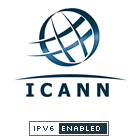There are a number of topics that are likely to be the focus of debate in Lisbon, including:
- Registrars' agreement. Registrars are the company that sell domain names to everyone else on the Internet. Both the agreement that registrars sign up with ICANN, and the accreditation process by which they are initially approved will come under scrutiny in Lisbon, sparked by the recent high-profile failure of Registerfly, a company which left an estimated 200,000 people unable to gain access to their Internet addresses.
- gTLDs: The final selection criteria for a new range of global top-level domains are being decided upon over the next few months. By this time next year, the Internet should have expanded a little further, quite possibly in some interesting new directions.
- IPv6. The Internet currently uses a protocol called IPv4 which provides 4.2 billion individual addresses on the Internet. However, due to the Net's explosive growth, these addresses are rapidly running out and so ICANN is trying to help foster a move toward IPv6 which will provide trillions and trillions of addresses. The problem is that for IPv6 to take hold there has to be a global upgrade of the Internet infrastructure - something that is incredibly difficult to organise.
- DNSSEC. This is a more secure form of the basic domain name system that the Internet runs on. Recent years have seen an explosion in irritating and sometimes criminal behaviour over the Internet because of its huge possibilities nd open architecture. DNSSEC is one way to help make the system more secure, and so safe, but its adoption remains a complex topic.
- IDNs. Despite its global reach, the Internet is still built on a code base that uses English lettering and numbers as its foundation. Internationalised Domain Names (IDNs) will enable people from across the world to use their own languages right through the Internet, making it a truly global resource. As with IPv6 and DNSSEC, however, there are very significant technical challenges to be overcome before IDNs are widely available.
- RALOs. Surprisingly few actual Internet users have ever even heard of ICANN and what it does, and as a result they have less of a voice in Internet issues than perhaps they might. The new Regional At Large Organisations due to be announced in Lisbon should go some way to correcting that by having organisations on each continent focussed on canvassing Internet users' opinions and feeding them into the ICANN process.
Among the other topics that will be discussed are:
- ccTLDs: All the top-level domain names that represent each country around the world.
- Domains: Domain names themselves have their own issues and problems.
- NomCom: The Nominating Committee is currently looking for people to apply to various positions within ICANN, including the Board, ALAC representatives and other constituency posts.
- Reviews, reports and plans: ICANN meetings are frequently used as the outing point for the reports, reviews and plans that have been drawn up since the previous meeting. The Lisbon meeting will see ICANN's first comprehensive Annual Report

Rights of others
Among the other topics I see the discussion about how to protect IP rights of companies with the new TLDs. There's a special working group with the GNSO about it.